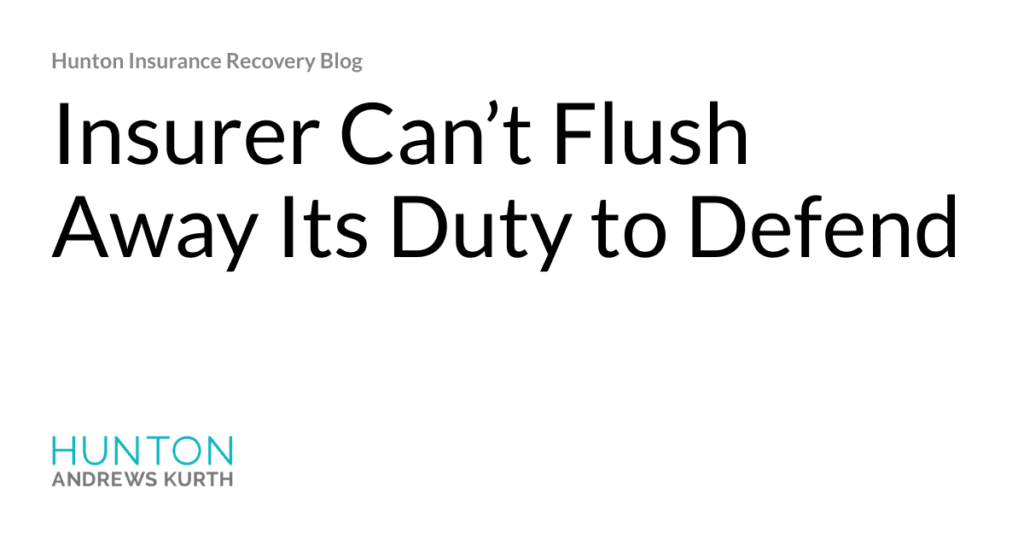Insurer Can’t Flush Away Its Duty to Defend

In a recent opinion, the Northern District Court of Illinois reaffirmed the bedrock principle that an insurer’s duty to defend is broad and triggered by any allegations in a complaint that potentially fall within a policy’s coverage grant. In Harleysville Pref. Ins. Co. v. Dude Products Inc., et. al., Case No. 21-c-5249 (N.D. Ill. Dec. 21, 2022), the insured, Dude Products, Inc., sought coverage from its insurer, Harleysville Preferred Insurance Company, against a class action lawsuit that alleged Dude Products intentionally and falsely marketed its wipes as “flushable” even though the product allegedly did not break apart and caused “clogs and other sewage damage.”
Harleysville had issued a commercial general liability policy and umbrella liability policy to Dude Products, which provided coverage for “property damage” caused by an “occurrence” during the policy period. The policies also contained exclusions for “expected or intended injury,” which precluded coverage for property damage that is expected or intended from the standpoint of the insured, and for “damage to impaired property not physically injured” which arises from a defect or dangerous condition in the insured’s product. Harleysville filed a declaratory judgment action seeking a determination that it did not have a duty to defend or indemnify Dude Products under the CGL or umbrella policy. Harleysville argued, among other things, that there was no “occurrence” because the class action complaint contained allegations of intentional misrepresentation, there were no allegations of “property damage,” and the “expected or intended injury” and “impaired property” exclusions would apply to preclude coverage.
The court noted that “[u]nder Illinois law . . . an insurance company’s ‘duty to defend under a liability insurance policy is so fundamental an obligation that a breach of that duty constitutes a repudiation of the contract.’” The court then analyzed the allegations in the class action complaint, noting that while the plaintiffs did not use the specific term “property damage,” there were factual allegations that encompassed property damage, including the allegations of injury in the form of “clogs or other sewage damage.” Using the same line of reasoning, the court found the class action complaint also alleged an “occurrence,” as under Illinois law, “damage to something other than the [insured’s product] itself does constitute an ‘occurrence[.]’” There were no allegations Dude Products intended the sort of damage its products caused and there was no causal connection between Dude Product’s alleged intentional misrepresentation as to the use of its product and the actual property damage caused by its product. For the same reasons, the court rejected Harleysville’s argument that the “expected or intended injury” exclusion applied. Finally, the court explained that the “impaired property” exclusion does not apply to third-party property that is physically damaged, such as the alleged damage to the putative class’s sewage systems. Harleysville’s duty to defend therefore was triggered.
Harleysville reaffirms that in most jurisdictions, an insurer’s duty to defend is broad and an insurer cannot flush away the fundamental obligation to defend its insured.







